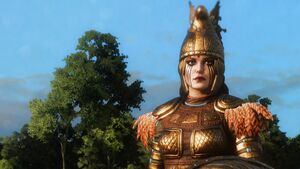Astyocheia
| Astyocheia | |
|---|---|
 Image of Astyocheia | |
| Abode | Northern Syara |
| Parents | Metrophanes (Father) |
| Consort | Orsilochus |
Astyocheia was a semi-legendary Queen of the Aleitians, daughter of Metrophanes, and wife of Orsilochus. She appears sometime just before the 1st Millennia BCE, though oral renditions of her saga were likely passed on for centuries prior.
According to myth, Astyocheia was the daughter of Metrophanes and an unnamed consort, whom had already sired seven sons. The family ruled over a tribe of Aleitians near modern day Sena. Normally Astyocheia would not have been considered for the throne, but each of her brothers met a premature demise through a mixture of battle, accidents, or illnesses, or were struck down by the Gods for their hubris. Astyocheia was thus the sole surviving heir when Metrophanes finally died, leaving his realm to be claimed by Chabrias. Astyocheia disputed his claim and demanded the throne by birthright, but Chabrias refused. Astyocheia then successfully goaded Chabrias into a duel, which Astyocheia unexpectedly won. Despite her victory, Astyocheia faced opposition from the chieftains of the other Aleitian tribes who did not wish to submit to her. Astyocheia promised to bring victory against the Kartozan if she was given the trust to lead the Aleitians into battle, and the other chieftains agreed to submit for a single battle to see if Astyocheia could prove her worthiness to rule.
Astyocheia led the Aleitians to battle against the Kartozan somewhere in the north Koryal Plain and successfully defeated them, which proved enough to warrant her rule as Queen of the Aleitians. Astyocheia led the Aleitians on numerous raids and campaigns during her rule, establishing herself as a prominent warrior-queen in Syara. At the age of 25 she launched a raid against the Kartozan and captured a prince by the name of Orinul. Astyocheia offered to free him if he helped bear her a successor, which he did and she gave birth to triplets. Although he was allowed to return home, Orinul instead chose to stay with the Aleitians and changed his name to Orsilochus.
Astyocheia continued to lead the Aleitians in battle, the most famous campaign coming against the Zeliat of Chryse. Astyocheia led 7,000 Aleitian warriors to the island and sacked the city of Yrep, slaying the Zeliant King Nukroy and taking his daughter Resanna as her captive (and in some versions, her lover). Astyocheia waged war against the Gruri at some point, which included slaying a Great Bull of Heaven in Górska and mounting its horns on her crown. After 25 years of rule however Astyocheia grew arrogant and prideful, boasting she was a superior warrior to Athena and a better hunter than Artemis. The two goddesses conspired to punish Astyocheia, and during a hunting trip with Orsilochus they transformed Astyocheia into a doe which Orislochus shot with an arrow, killing her. Her body transformed back to her human form, causing Orislochus to go mad and he threw himself into the bay of Slaveiko.
The Aleitian warriors recovered her body and "wept bitter tears" over her death, saying "She who was our Queen through adventure and hardship is gone forever". They burned her body as an offering to appease the Gods, then a group of warriors climbed to the summit of Mount Xena and deposited the ashes at the peak. The warriors did this so that the winds would blow the ashes away, allowing them to spread out and settle all over Syara.
Most historians agree that Astyocheia was a real Queen sometime during the Syaran Bronze Age, though details of her rule are virtually nonexistent outside of her myth. Coinage commemorating her reign can be found in the early 7th Century BCE, at which point she was an established figure in Syaran mythology. Astyocheia was a more prominent figure in the religious and mythological customs of Ancient Makedon, and it was not uncommon for Makedonian Kings to claim lineage from her. A temple to Astyocheia existed for centuries in the Makedonian capital of Parilla, and in modern Syaran culture the name has become a synonym for a fierce woman.